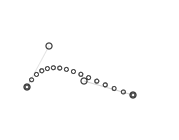ghost-cursor-frames
Version:
Move your mouse like a human in puppeteer or generate realistic movements on any 2D plane, this version has support for iframes
119 lines (89 loc) • 3.87 kB
Markdown
# Ghost Cursor
<img src="https://media2.giphy.com/media/26ufp2LYURTvL5PRS/giphy.gif" width="100" align="right">
Generate realistic, human-like mouse movement data between coordinates or navigate between elements with puppeteer
like the definitely-not-robot you are.
> Oh yeah? Could a robot do _**this?**_
## Installation
```sh
yarn add ghost-cursor-frames
```
or with npm
```sh
npm install ghost-cursor-frames
```
## Usage
Generating movement data between 2 coordinates.
```js
import { path } from "ghost-cursor-frames"
const from = { x: 100, y: 100 }
const to = { x: 600, y: 700 }
const route = path(from, to)
/**
* [
* { x: 100, y: 100 },
* { x: 108.75573501957051, y: 102.83608396351725 },
* { x: 117.54686481838543, y: 106.20019239793275 },
* { x: 126.3749821408895, y: 110.08364505509256 },
* { x: 135.24167973152743, y: 114.47776168684264 }
* ... and so on
* ]
*/
```
Usage with puppeteer:
```js
import { createCursor } from "ghost-cursor-frames"
import puppeteer from "puppeteer"
const run = async (url) => {
const selector = "#sign-up button"
const browser = await puppeteer.launch({ headless: false });
const page = browser.newPage()
const cursor = createCursor(page)
await page.goto(url)
await page.waitForSelector(selector)
await cursor.click(selector)
// shorthand for
// await cursor.move(selector)
// await cursor.click()
}
```
Usage with iframes:
```js
import { createCursor } from "ghost-cursor-frames"
import puppeteer from "puppeteer"
const run = async (url) => {
const selector = "#sign-up button"
const browser = await puppeteer.launch({ headless: false });
const page = browser.newPage()
const cursor = createCursor(page)
await page.goto(url)
await page.waitForSelector(selector)
const elementHandle = await page.$("frameSelector");
const frame = await elementHandle.contentFrame();
await cursor.click(selector, {}, frame)
}
```
### Puppeteer-specific behavior
* `cursor.move()` will automatically overshoot or slightly miss and re-adjust for elements that are too far away
from the cursor's starting point.
* When moving over objects, a random coordinate that's within the element will be selected instead of
hovering over the exact center of the element.
* The speed of the mouse will take the distance and the size of the element you're clicking on into account.
<br>

> Ghost cursor in action on a form
## How does it work
Bezier curves do almost all the work here. They let us create an infinite amount of curves between any 2 points we want
and they look quite human-like. (At least moreso than alternatives like perlin or simplex noise)

The magic comes from being able to set multiple points for the curve to go through. This is done by picking
2 coordinates randomly in a limited area above and under the curve.
<img src="https://mamamoo.xetera.dev/🧣👎😠🧟✍.png" width="400">
However, we don't want wonky looking cubic curves when using this method because nobody really moves their mouse
that way, so only one side of the line is picked when generating random points.
<img src="http://simonwallner.at/ext/fitts/shannon.png" width="250" align="right">
When calculating how fast the mouse should be moving we use <a href="https://en.wikipedia.org/wiki/Fitts%27s_law">Fitts's Law</a>
to determine the amount of points we should be returning relative to the width of the element being clicked on and the distance
between the mouse and the object.
## Note:
This is a fork of [Ghost Cursor](https://github.com/Xetera/ghost-cursor)
with support for iframes